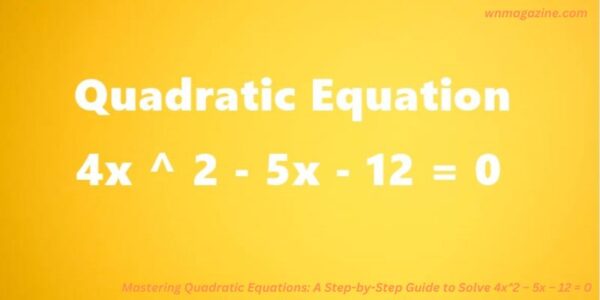Mastering Quadratic Equations: A Step-by-Step Guide to Solve 4x^2 – 5x – 12 = 0

Mastering Quadratic Equations: A Step-by-Step Guide to Solve 4x^2 – 5x – 12 = 0

Mastering Quadratic Equations: A Step-by-Step Guide to Solve 4x^2 – 5x – 12 = 0
Welcome to this article, where we will delve into the world of quadratic equations, with a specific focus on solving the equation 4x^2 – 5x – 12 = 0. Quadratic equations play a crucial role in algebra and hold significant importance in various fields of mathematics and technological knowledge.
Before delving into the solution of the quadratic equation 4x^2 – 5x – 12 = 0, it is essential to understand its characteristics and features.
Next Read: Wellhealth Ayurvedic Health Tips
Quadratic equations exhibit positive traits crucial to their study and solution. These include having a parabolic form, a vertex representing the minimum or maximum point, and symmetrical shapes. Understanding these characteristics provides insights into their behavior and practical applications.
The equation 4x^2 – 5x – 12 = 0 can be solved using various methods, each with its specific technique. The most common methods are factorization, completing the square, and the quadratic formula.
Quadratic equations are pivotal in various scientific and engineering disciplines. The roots of these equations can represent real-world quantities such as time of flight or maximum height in projectile motion, optimal solutions in economics, or equilibrium points in chemical reactions. Understanding the nature of these solutions, whether real, complex, or repeated, provides insights into the behavior of the system being studied.
To solidify our understanding, let’s work through examples demonstrating how to solve the quadratic equation 4x^2 – 5x – 12 = 0 using both the factoring method and the quadratic formula.
Example 1: Factoring Method
(2x + 3)(2x – 4) = 0(2x+3)(2x–4)=0
Equating each factor to zero gives 2x + 3 = 0 \Rightarrow x = -\frac{3}{2}2x+3=0⇒x=−23 and 2x – 4 = 0 \Rightarrow x = 22x–4=0⇒x=2. Therefore, the solutions are x = -\frac{3}{2}x=−23 and x = 2x=2.
Example 2: Quadratic Formula
x = \frac{-(-5) \pm \sqrt{(-5)^2 – 4 \cdot 4 \cdot (-12)}}{2 \cdot 4}x=2⋅4−(−5)±(−5)2–4⋅4⋅(−12)
After performing the calculations, we find the solutions to be x = -\frac{3}{2}x=−23 and x = 2x=2.
Also Read: wellhealth how to build muscle tag
By using the factoring method and the quadratic formula to solve the equation, 4x^2 – 5x – 12 = 0 we have obtained accurate values for “x.” This underscores the practical significance of quadratic equations in real-world applications, including engineering, projectile motion, physics, and more. Once you grasp the concepts of quadratic equations, you can efficiently solve mathematical problems and understand their underlying processes.
Notifications